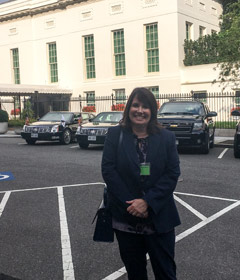Chemistry’s Lisa Lewis Gains New Perspective Through NSF Fellowship
Related Posts
Connect With Us
January 31, 2019
By Chuck Carlson
On the first day of her new assignment, Lisa Lewis learned an important lesson about navigating the often surreal and rarely routine atmosphere of Washington, D.C.
“I have a whole list of acronyms next to my phone,” she said.

Albion College chemistry professor Lisa Lewis, seen here in front of the White House last fall, has been working in Washington, D.C., on the Materials Genome Initiative as part of a yearlong fellowship through the National Science Foundation. Her work will continue through this summer.
She does, too. And there’s a good reason.
Lewis is an American Association for the Advancement of Science (AAAS) Science & Technology Policy Fellow (STPF) placed for the year at the National Science Foundation (NSF) in the Mathematical and Physical Sciences Directorate (MPS) in the Division of Materials Research (DMR) working to support the Materials Genome Initiative (MGI), a national initiative that involves many government agencies (NIST, NIH, AFRL and more)….well, you get the idea.
Yet for Lewis, all the acronyms and all the assignments and all the questions are what make this fellowship so intriguing.
AAAS Science & Technology Policy Fellowships (STPF) provide opportunities to outstanding scientists and engineers to learn firsthand about policymaking and contribute their knowledge and analytical skills in the policy realm. “It’s definitely taking me out of my comfort zone,” said Lewis, who moved to D.C. last August and will remain there through at least this summer. “But it’s exciting. I’m having an experience that will allow me to learn and grow.”
Lewis is one of 18 new AAAS STPF Fellows at NSF, all of whom are working on unique projects. Her one-year assignment supports the Materials Genome Initiative, or MGI. It’s designed to create a new era of policy, resources and infrastructure to help U.S. institutions discover, manufacture and deploy advanced materials twice as fast, at a fraction of the cost. Since 2011, the federal government has invested more than $250 million in this initiative.
“In short, we want to use Big Data to accelerate research by revealing new patterns, trends and understanding of materials properties and processes. It’s a new way of doing science, and it requires scientists to change the way we catalog, share and use data obtained from experiments or theoretical studies,” Lewis said.
Her work is complex, time-consuming, and challenging. It has taken her into unfamiliar areas of knowledge. But Lewis said that was the point of her applying for the fellowship in the first place.
“I had heard a lot about Big Data but really didn’t know a lot about this specific initiative until I interviewed for this placement,” she said. “As I started reading more, I recognized the real impact of these approaches. They require a paradigm shift for science. Big Data lets us use existing scientific data to fuel faster breakthroughs in new research.”
The yearlong fellowship is a new career direction for Lewis. She has been a chemistry professor at Albion since 1995 and has also served as associate provost, associate dean of faculty, chair of the Chemistry Department, director of admission events and academic liaison, and director of the Prentiss M. Brown Honors Program.
But even with that varied background, it’s a brave new world for Lewis.
“Eventually, this will affect how we train our scientists,” she said. “It’s going to change how we do science.”